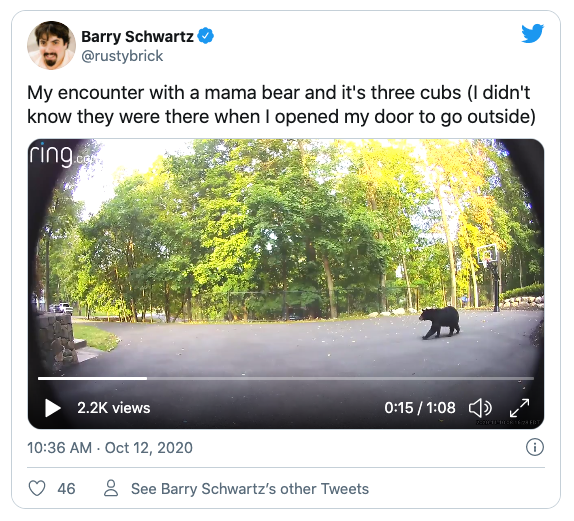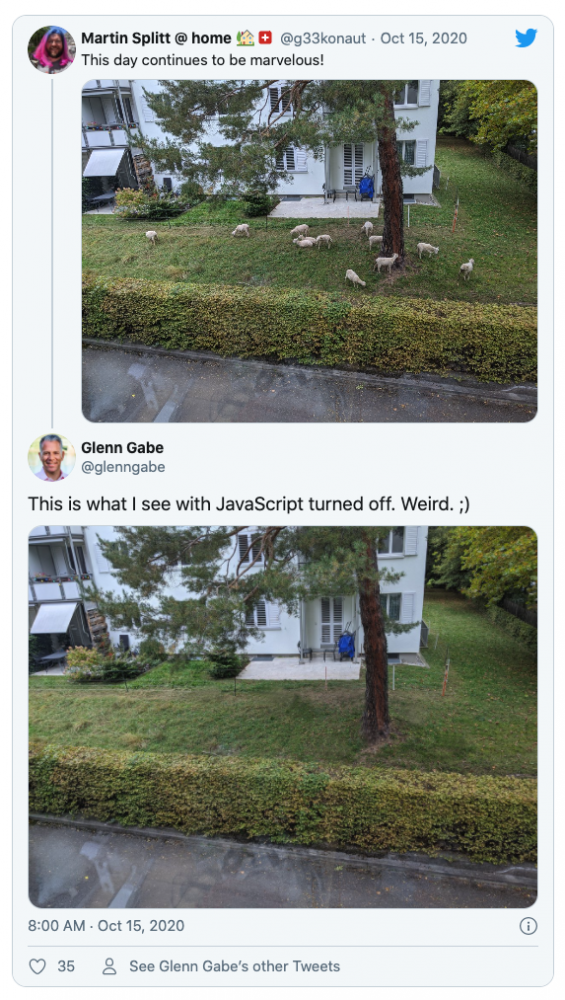| | | | 🩸 There Will Be Blood Traffic 🩸 |
|
| Organic (search) traffic is like oil.
It's an essential and valuable resource. It exists naturally in huge quantities. People will inevitably fight over it.
And organic traffic—like an oil well—provides continuous value to you, for virtually no cost, if you stake a legitimate claim to the land above it.
So... what is the traffic equivalent of drinking the Internet's milkshake? |
|
| | | It's called an SEO Magnet, and it's a strategy that CLIKK founder Russ Henneberry has been successfully deploying for years now.
Lifetime access is $95 — or $200 off — until the end of Thursday!
(It's recorded, so you don't have to join us live.)
|
|
| | | | | Today: the irresistible musk of search specialists, whether or not free shipping sells, and Amazon will literally pay you to forward them your receipts.
But first...
|
|
| | | | | | | | | the Crappy Guardians of the Digital Galaxy |
|
| or Current Claimants to Social-Media Regulation |
|
| There's a lot of talk these days of 'regulation this' and 'anti-trust that' and, while it's important stuff, it's all... a bit much, don't you think? Maybe it is history in the making, but nowadays it just feels like more noise.
So we got a breath of fresh air from this TechCrunch article, which cleared some fog for us and made it easier to see the whole picture. Their headline perfectly frames the question whose answer we'll be summarizing:
Who regulates social media?
Right now, the shortest answer is "everyone and no one." We say 'no one' because there's not yet any regulatory body specifically for social media, and we say 'everyone' because existing regulatory bodies are all clamoring to address these big-tech issues however they can, no matter how ill-fitted or ill-equipped each of them may be.
If you've heard Silicon Valley compared to the Wild West, it's entirely appropriate. They were both new frontiers, untouched places with gold hidden in the hills, and both were populated by opportunists long before law and order could get there. In fact, they were populated before there was infrastructure of any kind. Thus, Westerners of either sort tend to be more, shall we say, libertarian (self-sufficient and accustomed to relative lawlessness) even once civilization catches up with them.
That brings us to the present, where four types of regulatory groups have their sights set on Big Tech:
1️⃣ Federal Regulators. We're mostly talking about the FCC and FTC, but the former is too specialized and the latter isn't specialized enough.
☎️ The Federal Communications Commission (FCC) is meant to ensure that our channels of communication are robust and equitable—but their specific concern is access to the technology itself (like whether you have fair access to phone and broadband) and not how those channels are used or what is communicated upon them. ⚖️ The Federal Trade Commission (FTC) is basically meant to ensure that businesses of all kinds don't (flagrantly) lie to their prospects and customers, whether that means making sure Nabisco doesn't lie about how much cheese is in Cheez-Its OR taking Facebook to task for misrepresenting their data-protection and privacy policies.
All well and good, but there are three problems here. One: just because the FTC penalized Facebook for lying to consumers doesn't mean they have any special authority (knowledge OR power) in the social-media realm. Second and more generally: tech companies can do plenty of harm without a single mite of dishonesty. Third and finally: even record-breaking FTC fines are barely a speed bump to social-media giants, as shown by Facebook's $5B fine.
2️⃣ State Legislators. This group might seem automatically less powerful, but that's not necessarily true. As a general rule, and stemming from the 10th Amendment, states can make their own laws wherever federal law is left open; because federal tech law is still wide open, states have a lot of leeway to do what they think is best for their constituents (or for setting precedent).
The main example here is California; regardless of your politics, California's in a natural leadership position as the most populous state (with the largest head count in Congress) and the home of Silicon Valley. Even if laws like the CCPA have limited jurisdiction, they have an effect on tech companies, who are often forced to either (A) comply and splinter their product accordingly or (B) not comply and sever a huge chunk of their U.S. customer base.
3️⃣ Congress. This is where a new agency or regulatory body will ultimately be created, but it's still too early to see how that would shape up—and in the meantime, Congress is too frustrating and useless to discuss further.
4️⃣ European Regulators. This group is similar to State Legislators in that, yes, they're a separate legal body from our main concern Uncle Sam, but they're a legal body nonetheless and they have jurisdiction where a lot of social media's customers live. The main difference here—aside from, y'know, Europe being Europe—is that these groups tend to be less agile because their operating laws are based on member consensus, which takes a while to change.
|
|
| | | | | DAMN AMAZON, YOU THIRSTY: We've known that Amazon likes user data, but we didn't realize quite how intense their liking until now. Amazon is launching a new program called Amazon Shopper Panel, and the idea is basically that they'll pay consumers for data on the shopping they do outside of the Amazon ecosystem. Unsurprisingly, shopper surveys are part of this program—but surprisingly, they're more of a 'bonus option' in this case. So what is Amazon really after here? Your literal receipts, we s**t you not. You can submit pictures of paper receipts through the standalone Shopper Panel mobile app or, if it's an email receipt, you can (oh my God) forward it to a specific Amazon email address. Participants can earn about $10 in Amazon credit each month before optional bonuses; more details here.
IT's (STILL) QUIET... TOO QUIET: A couple of months back, we mentioned that the Googlebrain is about due for its regular tune-up—a.k.a. core algorithm update, which usually happens every three months or so—and that we'd check back in when we learned more. This is one of those times when the report is that there's nothing to report; still, this is officially weird on Google's part (we're about two months overdue at this point) and this post from Search Engine Roundtable confirmed that it's not just us wondering why there's still nothing. Again, we'll keep you posted when the next algo shifts are afoot.
EVEN LINKEDIN is DOING 'STORIES' NOW: We've already said most of what you need to know here—but still, it's a little surprising, since LinkedIn has long been the oddball of social-media platforms (and the smart strategies for using it have frequently banked upon this factor). We're only seeing the first digital-marketing applications for it, but we'll keep an eye on it as it becomes more popular... well, IF it becomes more popular. More here from The Drum.
|
|
| | | | | Is free shipping still an effective offer? |
|
| Short answer: yes.
For the longer answer, we'll start by clarifying our meaning for "effective." In this case, we mean "effective for (final) conversion," or getting customers to actually pull the trigger on a purchase.
There are a number of carrots offers you can use for this purpose, so let's mention a few examples and how likely they are (according to customer preference surveys) to help the customer complete a purchase:
Free Shipping — 56%
Faster Shipping Options — 52%
Free Gift with Purchase — 29%
In-Cart Discount — 26%
One quick note on each offer and why it is (or isn't) effective:
Free Shipping: Shipping is a natural necessity of e-commerce (unless you're talking about digital goods), so it will always add friction if the customer has to pay more for shipping and it will always remove friction if they know that shipping is covered for them.
Faster Shipping Options: The key thing to note here is that we're not talking about faster free shipping; we mean that customers want the option to get 1-day and 2-day shipping, even if they're paying a fairly high additional cost. In general, (A) people know this is a premium and yet (B) it's an especially important option in the 2020 holiday world.
Free Gift with Purchase: Simply put, it depends very much on the gift. This might be hugely attractive to people who want the free gift, but it might not add a single bit of value for other people, at which point it's a pure loss for your business. Only recommend this if you know you can nail it for a large segment of your shoppers.
In-Cart Discount: This one just isn't a good experience, frankly. Imagine if you were required by department-store staff to try on a piece of clothing before your coupon applied to your purchase; that would NOT go over well. So maybe don't play games with people?
|
|
| | | | | Which is greater?
Number of tweets sent daily (worldwide)
— OR —
Number of texts sent daily (USA) |
|
| Answer at the bottom of this email. |
|
| | | | | SEO Experts Attract Wild Animals |
|
| Or so we're led to believe by this post on Search Engine Roundtable. 🤔
First: on October 12, Barry Schwartz of Search Engine Land walked out the door of his house and saw three black bear cubs (and Mama) on his driveway. Per his tweet below, one of his house Ring cameras captured it. |
|
| | | You can hear the door open around 0:40, followed by a male voice saying "holy cow." (We would NOT have been so G-rated with our exclamations.)
Second: on October 15, Google's Martin Splitt looked out his window and saw a flock of wandering sheep eating the grass. Apparently this is not the first time this has happened.
Here's his tweet with a photo (plus smart-ass response from Glenn Gabe). |
|
| | | Premium Workshops from theCLIKK
- Lead Generation Mastery: Predictably build an email list of qualified prospects for B2B or B2C sales [Registration Fee: $295]
- Email Newsletter Mastery: How to Plan, Launch, and Virally Grow an Email Newsletter that Nurtures Leads and Drives Sales [Registration Fee: $295]
|
|
|
| '> OR <' ANSWER: Daily texts in the USA.
We send (not exchange, but one-way send) roughly 6 billion text messages per day in this country, whereas Twitter's global figures are closer to half a million tweets per day.
You could say SMS is the more ubiquitous and useful technology, or you could say that we Americans are loud and talk too much. You'd have a point either way.
|
|
| ADVERTISE // LICENSE OUR CONTENT // SUBSCRIBE
Copyright ©2020 Modern Publisher, LLC. All rights reserved.
538 S. Main St. Columbia, IL 62236
Love today's issue of theCLIKK? Hate it? Reply to this email and let us know. We're listening.
Some links are affiliate links. This means that if you sign up or buy something we might make a commission. That said, we only link to things we believe are beneficial to you, the reader. Pinky promise.
Issues? Email support@theclikk.com |
|
|
|
|






No comments:
Post a Comment